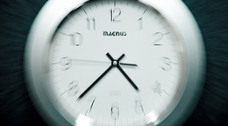
Diane B. Boivin, MD, PhD, founded the Centre for Study and Treatment of Circadian Rhythms at the Douglas Mental Health University Institute in 1997, thanks to the support from the Douglas Hospital Foundation and a grant from the Canada Foundation for Innovation (CFI).
Investigators at the Centre conduct multidisciplinary research on human circadian rhythms (daily rhythmic events) and sleep. Disorders of circadian rhythms may have far-reaching consequences such as chronic sleep deprivation associated with rotating shift work, reduction in workplace performance at certain times of day, cognitive impairments, as well as gastrointestinal, hormonal and cardiovascular disorders.
The Centre's aim is to propose new solutions to the problems that may be associated with sleep and circadian rhythms disorders. The team works in collaboration with colleagues with expertise in:
- Engineering
- Psychology
- Endocrinology
- Biochemistry
- Industrial Psychology
- Psychiatry
Mission
- To nurture new ideas in research on human circadian rhythms;
- To apply state-of-the-art techniques and knowledge to conduct research on human circadian rhythms and sleep;
- To conduct all aspects of the research with integrity and in an ethical fashion;
- To train the next generation of researchers in human circadian rhythms via the mentorship of graduate and undergraduate students;
- To provide an environment in which students and staff members are enriched by interactions with colleagues and other research groups, at conferences, and at the Douglas Mental Health University Institute;
- To actively participate in research by fostering collaborations with researchers from other fields of concentration, both locally and internationally;
- To transfer knowledge from the academic environment about practices promoting good sleep, good circadian hygiene and fatigue management.
Time isolation rooms
The Centre for Study and Treatment of Circadian Rhythms consists of three windowless isolation suites, which provide tightly controlled light levels and isolation from external time cues. Thanks to this design, participants can live comfortably in time-isolation for several weeks. This design also provides the opportunity to perform the varied and extensive protocols of the Centre for Study and Treatment of Circadian Rhythms, such as sleep deprivation, simulated jet lag, simulated night-shift work, constant routine, ultra-rapid sleep/wake cycles and forced desynchrony.
Isolation suites are built around a control room, which is centrally located and includes an area for intensive and long duration physiologic monitoring of a number of variables including:
- Sleep
- Rectal, cerebral and skin temperature
- Hormonal rhythms (e.g. plasma melatonin, cortisol etc.)
- Cardiac rhythm
- Vigilance, mood and performance
- Clock gene expression
Funding
The research team, their activities and development of the Centre for Study and Treatment of Circadian Rhythms infrastructure are supported by a number of agencies including:
Research granting agencies
Canadian Foundation for Innovation (CFI)
«Fonds de la recherche en santé Québec » (FRSQ)
Canadian Institutes of Health Research (CIHR)
«Institut de recherche Robert-Sauvé en santé et en sécurité du travail» (IRSST)
Natural Sciences and Engineering Research Council of Canada (NSERC)
Canadian Psychiatric Research Foundation (CPRF)
National Alliance for Research on Schizophrenia and Depression (NARSAD)
Fellowships
«Fonds de la Recherche en Santé du Québec» (FRSQ)
Canadian Institutes of Health Research (CIHR)
The Manulife Assurance Company of Canada
Research grants and contracts
Public works and Government Services Canada
«Société de l'assurance automobile Québec» (SAAQ)
«Commission de la santé et sécurité du Travail du Québec» (CSST)
Levinchi Foundation
The Litebook Company Ltd.
Donations
The Manulife Assurance Company of Canada
Douglas Institute Foundation
The Litebook Company Ltd.
Servier
Contact
Douglas Institute
Centre for Study and Treatment of Circadian Rhythms
Frank B. Common Pavilion
6875 LaSalle Boulevard
Montreal, Quebec H4H 1R3
For general information:
Tel.: 514-761-6131, ext. 3333
Fax.: 514-888-4099
To make an appointment at the Sleep Disorder Clinic:
Tel.: 514-761-6131, ext. 3301


